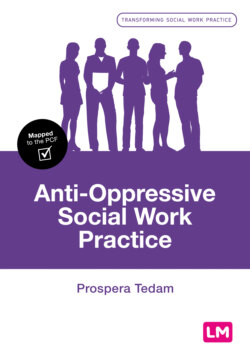Читать книгу Anti-Oppressive Social Work Practice - Prospera Tedam - Страница 8
На сайте Литреса книга снята с продажи.
Series editor’s preface
ОглавлениеDuring recent teaching sessions for student social workers, I have been struck keenly by the changes permeating our contemporary world. Values and ethics lie at the heart of social work and social work education, and we address these throughout all the books in the series. The positions that we take in terms of values and ethics is, to an extent, determined by context, time and experience, and these are expressed in different ways by students coming into social work education today and, of course, by the different routes that students take through their educational experience.
Since the turn of this century, we have witnessed shifts and challenges as the marketised neoliberal landscape of politics, economy and social life may attract little comment or contest from some, and even the acceptance of populist right-wing positions. We have also observed the political machinery directing much of statutory social work towards a focus on individuals apart from their environment. However, on a more positive note, we have also seen a new turn to the social in the #MeToo campaign where unquestioned entitlement to women’s bodies and psychology is exposed and resisted. We have seen defiance of those perpetuating social injustices that see long-term migrants alongside today’s migrants being abused and shunned by society and institutions, as well as by individuals.
It is likely that, as a student of social work, you will lay bare and face many previously unquestioned assumptions, which can be very perplexing and uncover needs for learning, support and understanding. This series of books acts as an aid as you make these steps. Each book stands in a long and international tradition of social work that promotes social justice and human rights, introducing you to the importance of sometimes new and difficult concepts, and inculcating the importance of close questioning of yourself as you make your journey towards becoming part of that tradition.
There are numerous contemporary challenges for the wider world and for all four countries of the UK. These include political shifts to the ‘popular’ right, a growing antipathy to care and support, and dealing with lies and ‘alternative truths’ in our daily lives. Alongside this is the need to address the impact of an increasingly ageing population with its attendant social care needs and working with the financial implications that such a changing demography brings. At the other end of the lifespan, the need for high- quality childcare, welfare and safeguarding services has been highlighted as society develops and responds to the changing complexion. As demand rises, so do the costs, and the unquestioned assumption that austerity measures are necessary continues to create tensions and restrictions in services, policies and expectations.
As a social worker, you will work with a diverse range of people throughout your career, many of whom have experienced significant, even traumatic, events that require a professional and caring response. As well as working with individuals, however, you may be required to respond to the needs of a particular community disadvantaged by local, national or world events, or groups excluded within their local communities because of assumptions made about them.
The importance of high-quality social work education remains if we are adequately to address the complexities of modern life. We should continually strive for excellence in education, as this allows us to focus clearly on what knowledge it is useful to engage with when learning to be a social worker. Questioning everything, especially from a position of knowledge, is central to being a social worker.
The books in this series respond to the agendas driven by changes brought about by professional bodies, governments and disciplinary reviews. They aim to build on and offer introductory texts based on up-to-date knowledge and to help communicate this in an accessible way, so preparing the ground for future study and for encouraging good practice as you develop your social work career. Each book in the series is written by academics and practitioners who are passionate about social work and social services, and aim to instil that passion in others.
Anti-oppressive practice is central to social work. The people we work with are often excluded from or marginalised in our societies; they are made vulnerable by unspoken assumptions or actions by those in powerful positions. Social work walks the interstices between oppressed people and normative society. This can be an uncomfortable position for social workers and is not easy to do in a way that is positively transformative. This book introduces you to core knowledge that will help you to explore some of the ways you can adopt and grow anti-oppressive and transformative practices, and to inculcate the values underpinning social work throughout the world.
Professor Jonathan Parker
June 2020
